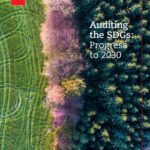On November 15th Nancy Kamp-Roelands successfully defended her doctoral thesis Towards a framework for auditing environmental reports at Tilburg University. A good audit report is well structured and should mention the data that have been audited, the objectives of the audit, the audit criteria, the audit work performed, the opinion and the expertise of the audit team. If any uncertainties exist they must be well explained. An audit that provides only assurance on the accuracy of the data included is misleading. Completeness and a fair presentation of all material issues are important as well. It is also confusing to provide assurance only on the accuracy of the data at corporate level without also having assessed the accuracy of the data at site level.
Audits of environmental reports first appeared just over ten years ago. Both the number of environmental reports and the audit of these reports is still increasing. Audit firms perform a major part of these audits. But other professionals are also active in this field. Even today there are still important differences in the scope of these audits, in the audit procedures performed, in the structure of the audit report and in the way the opinion is formulated. This is confusing for readers of environmental reports.
Differences in expectations regarding the audit may eventually lead to a loss of confidence in the auditor. The different kinds of auditors should therefore aim at more consistency in order to enhance credibility. In this thesis the various aspects common to all audits are identified. This general framework is further tailored using field evidence. Audit reports within European corporate environmental reports have been analysed. Further a survey is performed to detect differences in expectations between auditors and companies regarding the audit engagement and the audit report. Additional empirical evidence has also been obtained in relation to details about the audit process and particularly the planning and risk analysis. In this way a framework for the audit of environmental reports is proposed both to improve consistency and to provide a basis for auditing in this continually changing field.
The thesis Towards a framework for auditing environmental reports can be ordered at www.accountancyresearch.com
Nancy Kamp-Roelands studied business administration at Erasmus University in Rotterdam. In addition she followed the post-graduate courses in accountancy and environmental-accountancy. She is senior manager at Ernst & Young Environmental and Sustainability Services and researcher at Royal NIVRA. In this capacity she participates in various working groups of Royal NIVRA in relation to sustainability reporting and auditing. She is also a member of the Sustainability Working Party of the European Federation of Accountants, FEE. This year she is the chair of the European Sustainability Reporting Awards. Further, she is the secretary of the working group on corporate social responsibility of the Council on Annual Reporting. Since 1993 she is doing research in the field of environmental and sustainability reporting and auditing. In 1997 she received the Sinninghe Damsté award for her publications.



